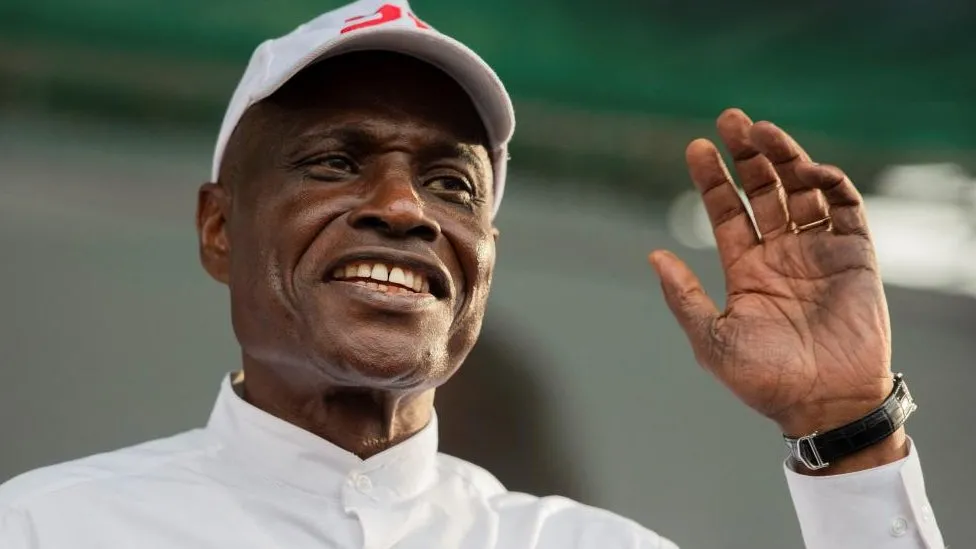In certain circles the name Martin Fayulu has become synonymous with tenacity – a refusal to give up.
One of the leading opposition candidates in the Democratic Republic of Congo’s 20 December presidential election, he maintains that he won the race five years ago.
Emblematic of the 67-year-old’s die-hard attitude is his biography on X, which declares him the country’s “president-elect”.
Campaign posters have him tapping his wristwatch announcing: “Now’s the time”.
In the aftermath of the 2018 election, Mr Fayulu, a former oil company executive, was not alone in questioning the victory of Félix Tshisekedi – who is running for a second term.
The influential Catholic Church, which had a large monitoring team, said the results did not correspond with its own findings.
Mr Tshisekedi had split off from the opposition coalition that had put forward Mr Fayulu, and it was suspected, though always denied, that he had the backing of then-President Joseph Kabila.
But as Mr Tshisekedi’s announced victory promised the first peaceful transfer of power in the country’s history, many groups came to accept it.
Mr Fayulu, however, did not.
The leader of the Commitment for Citizenship and Development party (ECiDé) has doggedly stuck to the message that he won. Now he has returned to claim his prize, hoping to succeed in the crowded field of 19 challengers to the incumbent.
Turning his rhetorical fire on the president, he has been uncompromising in his criticism.
“Is there a single Congolese who can tell me that he lives better than in 2018? Mr Tshisekedi has done absolutely nothing,” the candidate told the Reuters news agency in November.
Congolese Presidential candidate Martin Fayulu addresses his supporters during a campaign rally in Goma, North Kivu province, Democratic Republic of the Congo, November 30, 2023
Mr Fayulu uses the campaign symbol “21” – the number he was given in the official list of candidates
He first became a full-time politician in 2006 and served as an MP, though at the time he was mostly known as a businessman.
Mr Fayulu’s involvement in politics started during the Sovereign National Conference in 1991 that brought together delegates from different regions, political parties, civil society organisations and traditional leaders to campaign for multi-party democracy.
The country’s long-time autocratic ruler Mobutu Sese Seko allowed the conference to take place after coming under domestic and foreign pressure to end one-party rule. But he ignored the call for greater democracy, and was eventually forced out in 1997.
Mr Fayulu’s transition from business to politics was complete in 2006 when he was elected an MP.
Before that, he had had a two-decade-long career, starting in 1984, with US oil giant Exxon Mobil, taking up positions in several African states.
His final posting was in Ethiopia where he was the company’s director general.
line
In March 2009, Mr Fayulu helped launch ECiDé and was appointed its leader.
Despite his oil background he has claimed he speaks for the people.
“Congolese call me [the] people’s soldier,” Mr Fayulu told the BBC’s Focus on Africa radio programme in 2018.
In 2016 and 2017 he had been involved in protests against the extension of Mr Kabila’s time in power.
At one point, a bullet grazed Mr Fayulu’s head after police fired at anti-Kabila protesters in the capital, Kinshasa. At least 17 people were killed in the clashes.
Supporters of Congolese Presidential candidate Martin Fayulu cheer him at an election campaign rally in Goma, North Kivu province, Democratic Republic of the Congo November 30, 2023
Mr Fayulu hopes to capitalise on dissatisfaction with the security and economic situation in the country
In this election he has claimed he is the patriotic candidate.
“You have to entrust the country to someone who is not a thief, to someone who is not corrupt, to someone with proven skills, to someone with leadership, someone who is a patriot,” he told Reuters.
He has also talked about boosting security in the east of the country. The conflicts with a multiplicity of rebel groups there have forced some 6.9 million people to flee their homes.
Mr Fayulu has said he wants to have a well trained, well equipped army of 500,000 people.
And – perhaps most importantly if he wants to be sure of victory this time round – he has stressed the importance of vigilance on polling day, in order to prevent any attempt at electoral fraud.
But in a repeat of five years ago, Mr Fayulu is not the only strong opposition candidate challenging those in power. This split in the vote may ultimately cost him the job.
